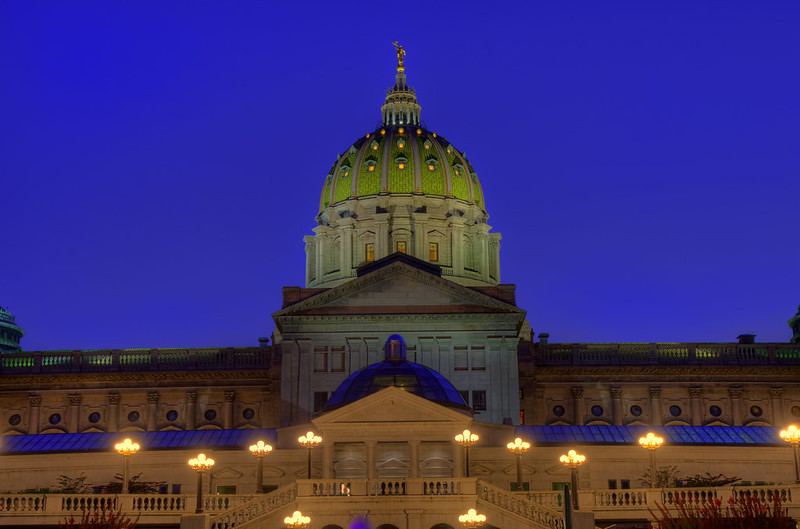
by Jen Quinn, Legislative and Political Director
As the year winds down, most of us look back at what has passed and turn an eye to the possibilities of next year. I intend to do the same here. The last few weeks of the legislative session in Harrisburg were, to say the least, busy. Most folks frown upon conducting the business of legislating in the post-election space known as a ‘lame duck’ session -- where retired or defeated elected officials can still cast a vote -- but our legislative dysfunction combined with the fiscal realities of Covid-19 necessitated a busy November.
Since Covid-19 has created serious budget shortfalls and significant unknowns, the legislature passed a five-month interim budget earlier this year which expired on November 30. This delay was meant to allow the state to focus on Covid response and to hopefully recover from spiking unemployment numbers. Eventually, both chambers managed to pass and the Governor signed a spending package that funds the state government through the remainder of the fiscal year.
While the budget has no new taxes and plugs the multibillion dollar holes in the budget with federal Covid aid and nearly half a billion dollars in transfers from state special funds, roughly $200 million came out of dedicated environmental and energy funds. For example, $50 million was taken from the Recycling Fund, $10 million from the Industrial Sites Cleanup Fund, $26 million from the PennVEST Drinking Water Revolving Fund, and $48 million from the Oil and Gas Lease Fund, which means community recycling programs will not be supported, fewer industrial sites will be cleaned up and made safe, projects to improve drinking water will not get done, and recreation and conservation projects will not be completed.
Luckily, we did not see cuts to the Department of Environmental Protection (DEP) or the Department of Conservation and Natural Resources’ (DCNR) budgets nor did we see money taken from the Environmental Stewardship Fund (ESF) or the Keystone Recreation, Park, and Conservation Fund, two hugely important conservation funds. However, given the fiscal impacts of Covid, these funds along with agency budgets will likely be on the chopping block during next year’s efforts to balance the state budget.
We also saw two good bills finally die in Committee. After nearly two years of effort by countless partner organizations, including Sierra Club staff and volunteers, HB 531, which would allow participants to subscribe to a portion of a local community solar project and get a a credit on their electricity bill, and SB 596, which would expand the network of electric vehicle charging stations in Pennsylvania, both died in the House Consumer Affairs Committee.
HB 531 was a bill with widespread bipartisan support and nearly 100 cosponsors, but the bill stayed in committee because the Consumer Affairs Committee chair would not bring it up for a vote. We’re hopeful it will get another chance next session because it’s a good program and shouldn’t be controversial. We’re also hopeful SB 596 will have a chance to pass next session because providing more charging stations for electric vehicles shouldn’t be controversial either. It should be common sense.
We also saw the Senate vote to concur (agree to amendments made in the House) in late November on SB 790, a very controversial bill that would reduce environmental and public health protections by limiting spill reporting requirements, relaxing well plugging and remediation standards, and allows drillers who’ve contaminated a water supply to provide replacement water that doesn’t meet Safe Drinking Water Act standards. Thankfully, Governor Wolf vetoed this bill and in his veto message, Governor Wolf stated, “While this legislation attempts to address the distinct challenges associated with the conventional oil and gas industry, it does so in a manner that does not adequately protect the environment and the public health and safety of the citizens of the Commonwealth, and would contribute to a legacy of environmental degradation.” We agree. Unfortunately, it’s likely we’ll see this bill again next session.
I think it’s safe to say that during the upcoming legislative session, there will be efforts to halt carbon pollution limits in Pennsylvania and joining the Regional Greenhouse Gas Initiative (RGGI), there will be attacks on the Clean Streams Law, and mail-in voting, and there will likely be efforts to expand fracked gas pipelines. And while this may sound discouraging, please keep in mind these are all things we’ve dealt with for the past few years, and by and large, have stopped these bills and we are more than ready to do it again.
We track hundreds of bills each legislative session and we work in the legislature to protect our environment and the public health. Stay up-to-date on all of the legislation we are tracking here and sign up here to get regular legislative updates.
This blog was included as part of the 2021 Winter Sylvanian newsletter. Please click here to check out more articles from this edition!